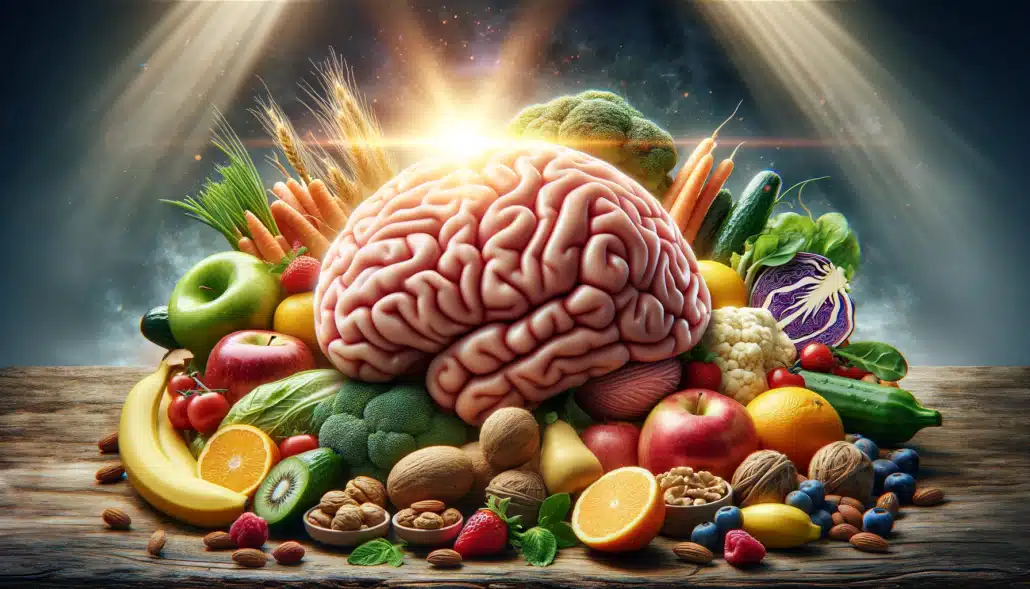Unlock the Secrets to Optimal Brain Health: Expert Tips and Strategies
Welcome to the official Brain Health section of Jonathan Bailor! If you’re interested in more of our health guides and topics, make sure to check out our Colon Health, Cough and Phlegm, Gut Health, Thyroid Health or Hormone Health sections! Let’s dive in.
Imagine a life where your mental prowess remains sharp as you age and your cognitive abilities continue to thrive. This is possible when you take charge of your brain’s health. Unlocking the secrets to optimal brain health begins with understanding its multifaceted nature and adopting a brain-healthy lifestyle. Are you ready to embark on a journey towards a healthier and happier mind?
Key Takeaways
- Understand brain health to optimize thinking ability, mood & daily task performance.
- Maintain physical and cognitive health through diet, nutrition, exercise & sleep.
- Reduce the risk of cognitive decline by engaging in mental exercises and managing chronic conditions through lifestyle modifications.
Understanding Brain Health
The complexity of brain health goes beyond simple mental exercises and memory games. It encompasses maintaining cognitive function, preventing neurological disorders, and overall well-being. With the growing prevalence of mental health concerns and neurological diseases, brain health research has become increasingly essential in finding ways to maintain a healthy brain and its functions.
Optimal brain health involves nurturing brain cells, forging new brain connections, and protecting the nervous system from damage. Its importance lies in its direct impact on our thinking ability, mood, and daily task performance, contributing significantly to overall well-being and quality of life. Improving brain health effectively addresses various mental health conditions and helps in preventing neurological disorders.
The Connection Between Physical and Cognitive Health
You might be surprised to learn that your physical health significantly impacts your cognitive health. Factors such as cardiovascular health, obesity, and blood pressure play a crucial role in maintaining optimal brain function. For instance, high blood pressure levels have been linked to decreased cognitive abilities, particularly in older adults. In some cases, healthcare providers might suggest weight loss medications to assist compatible individuals whose weight significantly impacts their physical or cognitive health.
To preserve your cognitive health, it is essential to address physical health factors that may harm your brain. The following factors play a significant role in sustaining the well-being of brain cells and maintaining overall brain health:
- Diet and nutrition
- Physical activity
- Sleep
- Environmental factors
By focusing on these aspects, you can protect your cognitive abilities and reduce the risk of cognitive decline.
Adopting a Brain-Healthy Lifestyle
A brain-healthy lifestyle is the foundation for optimal cognitive function and reduced risk of cognitive decline. By engaging in regular exercise, consuming a nutritious diet, and participating in mental exercises, you can stimulate cognitive function and minimize the risk of cognitive decline.
Let’s examine these key components more closely.
Exercise Regularly
Physical activity significantly boosts cognitive performance and cuts down the risk of Alzheimer’s disease. Regular exercise stimulates the brain’s capacity to maintain existing neural connections and form new ones, which are essential for cognitive health. Some benefits of physical activity on cognitive health include:
- Improved memory and attention
- Increased creativity and problem-solving skills
- Reduced risk of cognitive decline and dementia
- Enhanced mood and overall well-being
Aerobic exercises like brisk walking provide more benefits to cognitive health than non-aerobic stretching and toning. This is due to its tremendous effect on overall well-being.
To reap the cognitive benefits of exercise, adults should aim for at least 150 minutes (2.5 hours) of physical activity per week. Incorporating exercise into your daily routine not only improves your physical health but also promotes a healthier brain and cuts down the risk of cognitive decline.
Maintain a Nutritious Diet
A balanced diet is another vital component of brain health. Consuming high-fat and high-sodium foods can lead to health complications like heart disease and diabetes, which can negatively affect the brain. On the other hand, a nourishing diet positively impacts brain health by:
- Regulating neurotransmitter pathways
- Enhancing synaptic transmission
- Improving signal-transduction
- Enhancing learning and memory
- Protecting against dementia and cognitive decline
Maintaining a healthy, balanced diet with lower levels of fat and increased amounts of vegetables and fruit is necessary to cut down on the risk of cognitive decline. Diets such as the Mediterranean and MIND diets have been identified as potential options for preserving cognitive function and reducing the risk of dementia.
Engage in Mental Exercises
Mental exercises are crucial for maintaining brain health and improving overall cognitive function. Participating in intellectually stimulating activities such as:
- puzzles
- reading
- learning new skills
- engaging in social interactions
can help improve memory, increase problem-solving abilities, and reduce the risk of developing brain disorders like dementia and Alzheimer’s.
Challenging your brain with new experiences and tasks promotes cognitive function and brain plasticity, which are important for overall brain health. So why not pick up a new hobby, join a local club, or learn a new language? These mental exercises will not only keep your brain healthy but also enrich your life.
The Role of Sleep in Brain Health
Adequate sleep is a vital component of optimal brain health. Insufficient sleep, such as that experienced with insomnia or sleep apnea, can lead to cognitive issues, including memory and reasoning difficulties. During the four stages of sleep, the brain undergoes memory consolidation, emotional regulation, and overall restoration and rejuvenation, which are essential for maintaining cognitive health.
Addressing sleep problems is key to protecting your brain health. By seeking medical treatment for sleep disorders like:
- Insomnia
- Sleep apnea
- Restless legs syndrome
- Narcolepsy
You can improve brain function and overall cognitive health. Make sleep a priority to ensure your brain has the rest it needs to function optimally.
Social Interaction and Brain Health
Social interaction and engagement in meaningful activities play a significant role in supporting brain health. Research has shown that social isolation and loneliness may increase the risk of dementia, while a decrease in social activity has been correlated to a decline in cognitive function.
Participating in social activities like visiting with family and friends, volunteering for a local organization, or joining a walking group stimulates your brain, enhances your well-being, and reduces the likelihood of cognitive impairment and dementia. So, make time for social interactions and enjoy their cognitive benefits.
Managing Chronic Health Conditions
Managing chronic health conditions such as high blood pressure, diabetes, and heart disease can have a significant impact on your cognitive health. Research has indicated that high blood pressure in midlife increases the risk of cognitive decline later in life. The SPRINT-MIND study demonstrated that intensive lowering of blood pressure can reduce the risk of mild cognitive impairment, a risk factor for dementia.
For certain individuals with obesity-related chronic conditions like the above, weight loss drugs may be a part of the treatment plan when recommended by a healthcare provider.
Taking measures to regulate or reduce high blood pressure through physical activity, dietary alterations, and pharmaceuticals delays cognitive decline and protects brain health. It is essential to manage chronic health conditions and seek medical treatment to ensure optimal cognitive health.
The Impact of Stress on Brain Health
Chronic stress can have a profound effect on cognitive health and increase the likelihood of developing Alzheimer’s disease. Some effects of chronic stress on cognitive health, which may contribute to developing Alzheimer’s disease, include:
- Imbalance in neural circuitry
- Cognitive impairments
- Mood disorders
- Long-term changes in the structure of the brain
- Reduced brain volume
These effects can impair cognition and emotional functioning, potentially leading to other mental health concerns.
Implementing stress management techniques, such as mindfulness, meditation, and relaxation exercises, can help alleviate the negative effects of chronic stress on cognitive health. Effectively managing stress not only improves your mental well-being but also safeguards your brain health.
Brain Injury Prevention and Recovery
Preventing brain injuries like falls and accidents is vital in reducing the risk of cognitive decline and dementia. Taking measures like engaging in fall prevention initiatives, wearing helmets, and fastening seat belts can significantly decrease the likelihood of brain injuries in older adults.
In cases of traumatic brain injuries, it is important to seek appropriate treatment and rehabilitation to reduce cognitive decline and protect brain health. Organizations like the Traumatic Brain Injury Center of Excellence provide expertise and direction in evaluating and managing unusual medical circumstances.
The Future of Brain Health Research
As our global population ages and the burden of neurological disorders increases, future research on brain health should be directed toward devising novel approaches for assessing and enhancing brain health. These new strategies may include using artificial intelligence, clinical research, and innovative health services to address the challenges of an aging population and the increasing prevalence of neurological disorders.
Advancing brain health research helps develop more effective ways to assess and promote brain health, thus improving the lives of countless individuals affected by cognitive decline and neurological disorders.
The future of brain health research holds immense promise for unlocking the secrets to optimal brain health, including a deeper understanding of brain structure.
Summary
In conclusion, understanding and adopting a brain-healthy lifestyle is essential for maintaining optimal cognitive health and preventing neurological disorders. By focusing on exercise, nutrition, sleep, social interaction, stress management, and managing chronic health conditions, you can unlock the secrets to optimal brain health. While adopting a brain-healthy lifestyle is essential, certain individuals may benefit from targeted medical interventions, such as weight loss drugs, under professional guidance. So, take charge of your brain health today and pave the way for a mentally sharper and more fulfilling life.
Frequently Asked Questions
How can I improve my brain health?
To improve brain health, exercise regularly, get plenty of sleep, eat a Mediterranean diet, stay mentally active, remain socially involved, and keep your blood vessels healthy.
How can I sharpen my brain?
Keep your mind sharp by learning a new language, trying new activities, eating brain-boosting foods, exercising, getting enough sleep, staying on top of your health conditions, meditating, and connecting with others.
At what age do memory problems start?
For most people, memory problems start to become more pronounced after the age of 50, although in rare cases, early-onset Alzheimer’s can begin as early as a person’s 30s. Generally speaking, symptoms of memory-impairing illnesses appear around age 65 or later.
What are the signs of a healthy brain?
A healthy brain is marked by clear thinking, sharp memory, strong concentration, and an improved mood. Additionally, good sleep and a balanced diet are essential components to maintaining healthy brain function.
How does regular exercise benefit cognitive health?
Regular exercise boosts cognitive health by stimulating the formation of new neural connections and can help reduce the risk of Alzheimer’s disease.





















